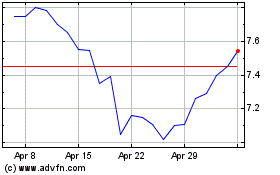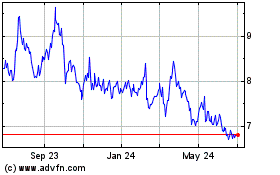UPDATE:Ford, Best Buy Partner To Sell Electric Charging Stations
January 07 2011 - 5:34PM
Dow Jones News
Ford Motor Co. (F) and Best Buy Co. Inc. (BBY) will partner to
install household charging stations for the new Focus Electric cars
being launched in the U.S. later this year, Ford said Friday.
The Detroit auto maker is launching its first pure electric
vehicle later this year as competition for zero-emissions cars
heats up in the U.S. Nissan Motor Co.'s (NSANY, 7201.TO) Leaf and
Chevrolet's Volt were recently launched and about a dozen electric
models are expected to hit dealerships in the next three years.
This is being supported by billions of dollars of federal tax cuts
and subsidized loans and grants to auto makers.
Ford's announcement comes at a time when high gasoline prices,
hovering around record levels for the off-peak winter season, are
raising concerns about the impact on consumers' wallets given the
shaky economic recovery.
But electric cars face a major uphill battle before they gain
widespread popularity in the U.S. because they are more expensive
than conventional cars, require hours to charge and have a limited
driving range based on the battery.
Executive Chairman Bill Ford said that electric-vehicle
technology is a "game changer" for the industry and a core part of
the company's strategy to improve efficiencies and reduce
greenhouse gas emissions blamed for global warming.
"We've committed to becoming a leader in fuel economy in every
segment," whether they run on petroleum or battery-supplied
electricity, Ford said. He added that the company takes the view
that gasoline prices will march higher and there could be increases
in demand for hybrids and electric cars during those periods.
Early adopters of the Focus Electric, which will initially be
released in 19 cities, will be higher-income drivers who are
willing to overlook the technology's limitations in an effort to
curb carbon emissions, Nancy Gioia, Ford's global director of
electrification, said in an interview.
"We are electrifying our highest volume global platform" for
producing vehicles, Gioia said, but she expects the overall rate of
adoption to be modest. "There are still a lot of technological
enhancements and improvements that need to happen on the battery
itself," such as improving durability and performance during hot
and cold temperatures, she said.
The partnership with Best Buy will help facilitate the process
with these early Focus Electric buyers by evaluating homes, working
with electricians on permitting issues and installing the units,
Gioia said.
Best Buy will sell the portable 240-volt charging stations at
nearly 1,200 stores nationwide or online for $1,499, or 30% less
than competing systems. The retailer will also handle warranty and
repair claims for the unit. It will take three to four hours to
charge the Focus, or about half the time as the Nissan Leaf,
according to Ford. By comparison, Nissan estimates the entire cost
for installing its charger is $2,200.
Even with consumer tax credits, the additional cost for a
charging station on top of the premium consumers typically pay for
electric vehicles, versus conventional gasoline cars, and an
installation process that can take up to four weeks could deter
adoption of the electric cars.
Ford has not released the price of the Focus Electric or said
how many it expects to sell, but Gioia said the car will be
competitively priced. The Leaf goes for about $33,000 and the Volt
is priced at around $41,000.
The Focus Electric will have a "better" mile-per-gallon
equivalent than the 60 miles-per-gallon the Environmental
Protection Agency rated the Chevrolet Volt and will be competitive
with other electric vehicles. The Leaf was rated at 99 MPG
equivalent.
Gioia said that Ford's electric car could travel 100 miles in
mild temperatures and flat roads. To ease so-called range-anxiety
concerns, Ford also unveiled a mobile-phone application that allows
drivers remotely begin charging cars that have been plugged in,
locate the vehicle and plan trips based on battery life.
The total battery capacity is 23 kilowatt hours and Ford
estimates it will cost $2 to $3 to fully charge the vehicle. By
comparison, the battery capacity for Volt is 16.5 kWh and for the
Leaf it is 24 kWh.
Hybrid and electric vehicles will make up about 10% to 25% of
Ford's vehicle fleet by 2020, with hybrids making up about 70% of
that share, Gioia said. Today hybrids make up 1% of Ford's fleet.
The company sold about 2 million vehicles in the U.S. last
year.
Ford shares closed up 5 cents, or 0.3%, at $18.27 Friday. The
stock has rebounded 60% over the past 12 months.
-By Naureen S. Malik, Dow Jones Newswires; 212-416-4210;
naureen.malik@dowjones.com
--Michael Ramsey in Detroit contributed to this article.
Nissan Motor (PK) (USOTC:NSANY)
Historical Stock Chart
From Jun 2024 to Jul 2024

Nissan Motor (PK) (USOTC:NSANY)
Historical Stock Chart
From Jul 2023 to Jul 2024
